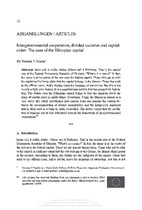| dc.contributor.author | Fessha, Yonatan | |
| dc.date.accessioned | 2021-05-26T09:55:12Z | |
| dc.date.available | 2021-05-26T09:55:12Z | |
| dc.date.issued | 2020 | |
| dc.identifier.citation | Fessha, Y. (2020). Intergovernmental cooperation, divided societies and capital cities: The case of the Ethiopian capital. Verfassung und Recht in Übersee , 53(1), 12-29 | en_US |
| dc.identifier.issn | 0506-7286 | |
| dc.identifier.uri | http://hdl.handle.net/10566/6198 | |
| dc.description.abstract | Some call it Addis Ababa. Others call it Finfinnee. That is the capital
city of the Federal Democratic Republic of Ethiopia. "What's in a name?" In fact,
the name is at the centre of the row over the federal capital. Those who opt to refer
the capital as Finfinnee claim that the capital belongs to the Oromo. Those that stick
to the official name, Addis Ababa, reject the language of ownership. But this is not
merely a fight over history. It is a constitutional politics that has gripped the federation.
The debate over the Ethiopian capital brings to fore the question about the
place of capital cities in multi-ethnic federations. Using the Ethiopian capital as a
case study, this article investigates how capital cities can manage the tension between
the accommodation of diverse communities and the indigeneity argument
that is often used as a basis to claim ownership. The article argues that the mediation
of tensions can be best addressed through the framework of intergovernmental
cooperation. | en_US |
| dc.language.iso | en | en_US |
| dc.publisher | Nomos Verlagsgesellschaft | en_US |
| dc.subject | Ethiopian capital | en_US |
| dc.subject | Accommodation of diverse communities | en_US |
| dc.subject | The indigeneity argument | en_US |
| dc.subject | Intergovernmental | en_US |
| dc.title | Intergovernmental cooperation, divided societies and capital cities: The case of the Ethiopian capital | en_US |
| dc.type | Article | en_US |

